What’s the best way to travel around Australia?
We get asked this question a lot and we wished we investigated it more before we chose a camper trailer to travel around Australia.
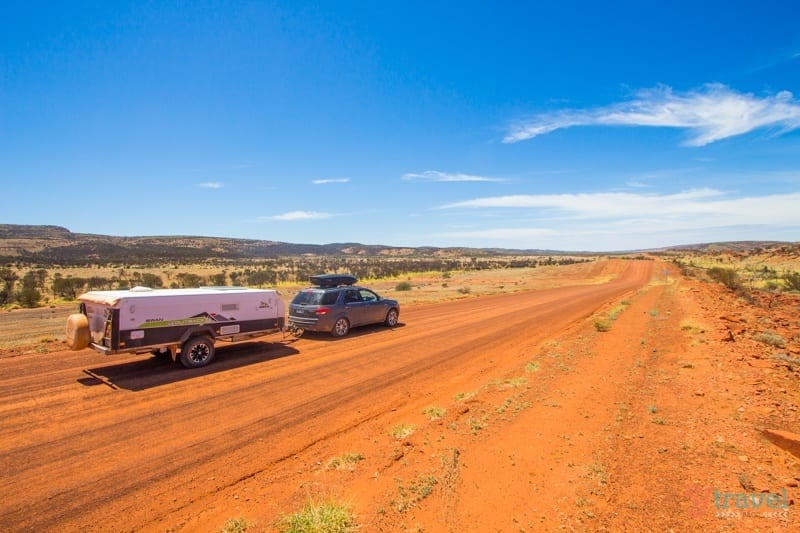
Apart from a tent, and a car, our only personal experience was a camper trailer, so we can’t speak from experience when we talk about caravans.
But, our opinion is also based on what we saw from the experiences of others on our road trip around Australia and people we became close friends with on the road who also travelled with kids.
Travelling around Australia in a camper trailer

There are different types of camper trailers you can travel around Australia with:
- A flip-over camper mostly has a sealed hard top when travelling and opens to the rear to become the floor which is suspended off the ground on legs.
- Soft floors tents are set up usually by removing the soft vinyl tonneaux cover, pulling the canvas out & extending the internal frame.
- A wind up with a hard floor and roof like our Jayco Swan. Some have beds that come out the ends. The interior is then similar to a caravan.
PROS of a camper trailer:
- Generally cheaper than caravans.
- Lighter to tow, consumes less fuel and not as slow as caravans.
- Safer to tow – more vision to see out the back and less fishtailing.
- Closer to nature with the canvas roofing and sides – more open so natural air can enter.
- Easier to store.
- Can access more off-road locations due to size.
CONS of a camper trailer:
- Time-consuming to set up and pack down (typically 90 minutes for us) Because we run a full-time online travel business often we found ourselves moving every 2-3 days and having to constantly set up then pack up became exhausting over 12 months. If you are time poor like us and move frequently, bear this in mind. These campers are more suited to spending at least 5 days in each location.
- Lack of storage space means cramped living and less conveniences
- More gaps, means more bugs keeping you awake at night
- No amenities. Nothing beats your own toilet in the middle of the night and a shower when campsite amenities are filthy
- Less privacy as the walls are canvas and easy to look through.
- Less storage – small bar fridge, limited cupboard space!
- Not so great in bad weather (high wind, rain, extreme heat). We had no air/con and suffered for a month in the Red Centre with temps over 40 degrees. And one of our beds broke in high wind in Denham, WA.
- Can’t pull over on long drives and have instant access to the interior.
- Dust easier to enter.
Travelling around Australia in a Caravan
Caravans come in all shapes and sizes.
Do your research to decide on what brand, size, and floor plan suits you.
Our friends had a New Age Caravan, which I liked a lot. (And so did they. ) We travelled with them for nearly six months so got to know it.
Other friends we spent a lot of time with had a Jayco Expanda.
PROS of a caravan:
- Much less set up and pack up time!
- More storage space to have everything in it place / full fridge, so no need to set it all up when you arrive in a new place again.
- Can pull over the side of the road and you’re ready to sleep, or you can grab yourself a cuppa and a snack (cheaper)
- Easier to be self-sufficient.
- A bit more luxury with air-con, TV’s, and separate bedrooms and bathrooms (you can go even more lux with some!)
- Less cracks and screen doors keep the critters and dust out.
CONS of a caravan:
- More expensive.
- Heavier to tow – meaning a potentially bigger and more expensive vehicle.
- Less access to certain areas, caravan parks.
- Harder to park in town and store.
Other ways travel around Australia
Travelling Australia with a Tent
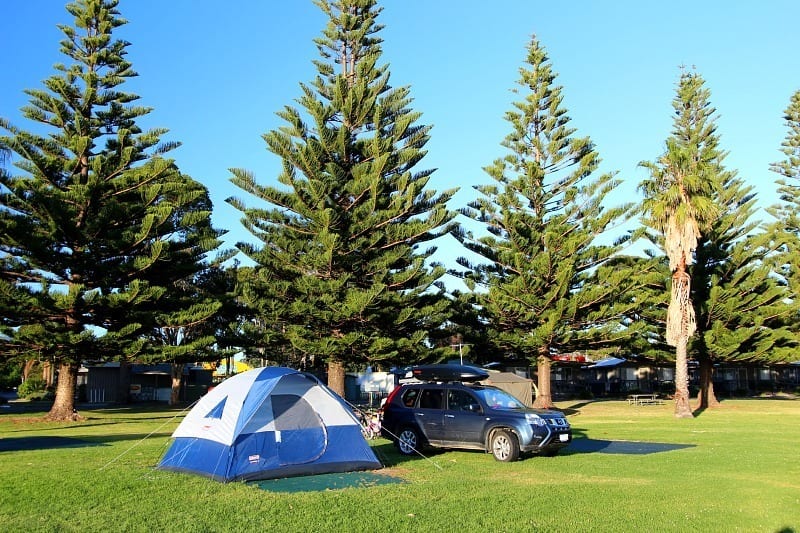
Tents are great for bush camping and small trips, but it’s pretty hard core to do a lap of Australia in a tent depending on your circumstances.
We began our road trip around Australia with just a tent, and it quickly became way too challenging with schooling the kids and a lack of space, and especially running a full-time online business, it just wasn’t practical.
For some people, travelling around Australia in a tent might be a dream, it definitely will be cheaper.
Sleeping in your vehicle
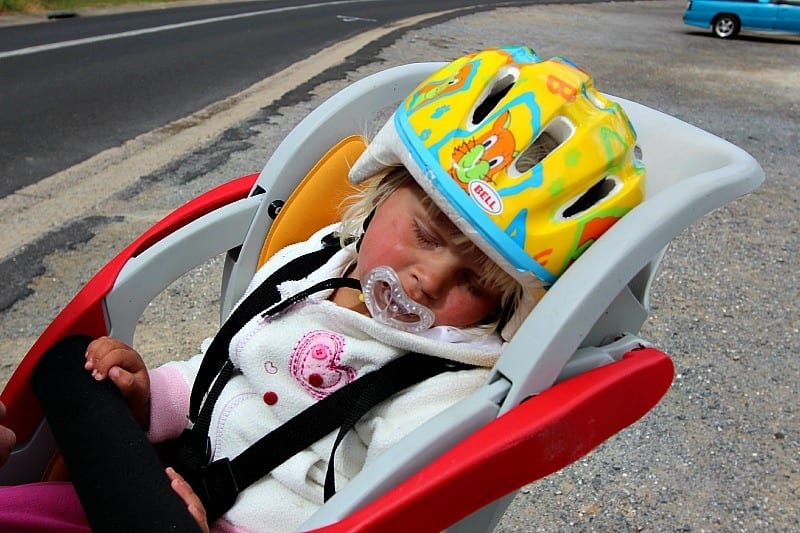
Many people use their vehicles and turn them into pretty cool sleeping quarters at night. Some just pop out a tent or swag or sleep in the tray.
Some have pop-up tents on the roof of their vehicles. Others through a mattress in the back of a van.
It all depends on how you want to travel and who you are travelling with? Are you travelling solo, as a couple, or with kids like us, and what your comfort level is?
Motorhome
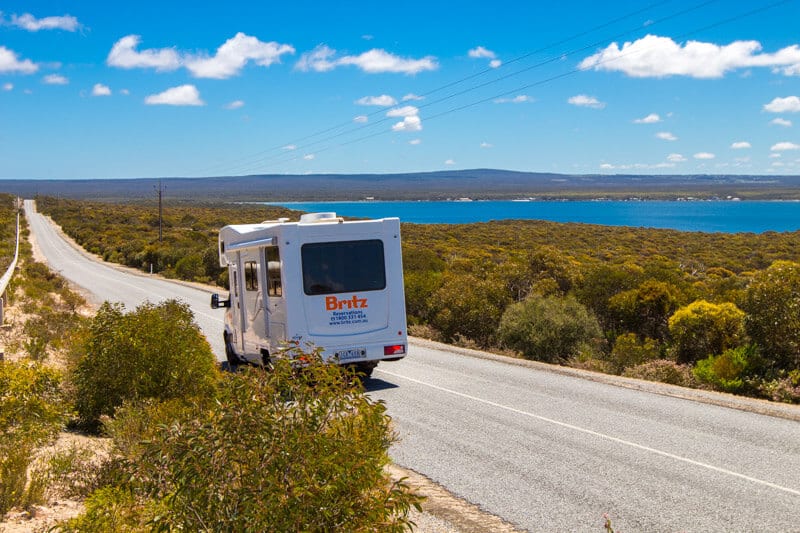
A motorhome can be a great option to travel around Australia in. Like a caravan, set up is minimal, just plug in and relax!
We used to get so jealous when a motorhome would pull up next to us in a caravan park. Within 5-10 minutes they are set up and kicking back in their camp chairs with a glass of vino in hand – 90 minutes later we are still slaving away!
The only problem is the home is also your vehicle, so you can never quite fully get set up for a few days in one spot.
When it comes time to explore, you’ll have to pack a few things away to drive to town or to your activity. That is unless you’re super organised and don’t have a lot of stuff.
We saw many people travelling around in much smaller minivans, hires from companies like Juicy and Apollo. Like the larger motorhome, it is also your vehicle so pack up is required each time you want to move.
And of course, the vehicle most likely won’t be 4WD, which restricts a lot of the places you can get to.
UPDATE:
We recently experienced a 10 day trip in a motorhome. I stick by what I said above with the limitations. I think they are great for small trips and in places that don’t require off road exploring.
But, for longer trips and travelling around Australia, I think they are too limiting.
I did not like having a separate vehicle and home. I found it claustrophobic all being in one and there was no opportunity for me to jump in the car and escape on my own some where!
Our girls loved it but I felt Savannah was still too young. She’s five and still quite demanding so it was very awkward for me to attend to her when driving. She was too far away in the back of the motorhome and often I couldn’t even hear her.
Older families might enjoy this separation, it just didn’t work so well with our girls.
Expandas
Our friends Nick & Emma (The Blockshoppers) run TheBlockShop website which is connected to the reality TV show, and they travelled around Australia in a Jayco Expander with two kids of similar age to ours.
We met them in Cairns and spent several months travelling together.
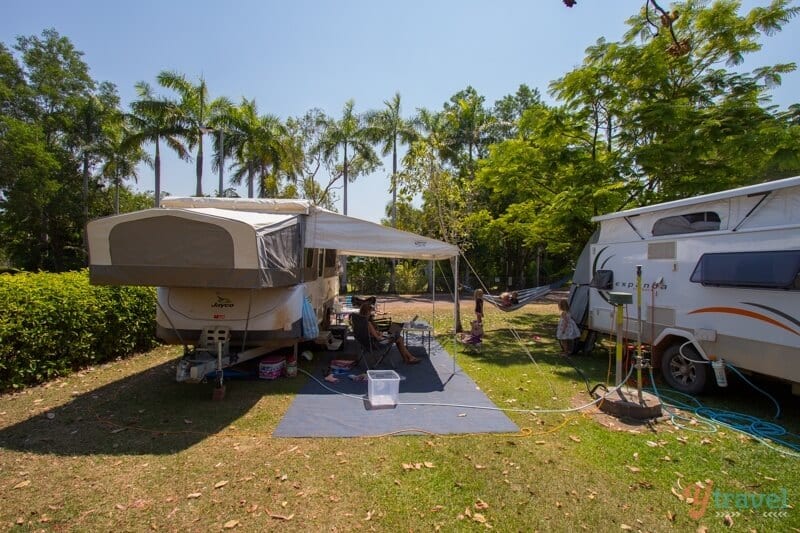
An Expanda is kind of a cross between a caravan and a camper trailer.
Just a small part of the roof pops up and they have wind out beds. It’s less set up than our camper trailer, but they still felt it took them quite a while.
Best vehicles for travelling around Australia?

We had a Ford Territory AWD, which is a type of 4WD, but has low clearance and no low-range so limited with places you can take it.
It’s more like a fake 4WD for suburban families. If we were to do it again we’d take a hard-core 4WD so we can get to more special places.
Remember, clearance is vital.
Our Territory sat quite low and we got bogged in Kakadu and couldn’t cross several rivers like along The Gibb River Road in The Kimberley’s, had to hire a 4wd to do Fraser Island, and definitely couldn’t do Cape York.
A hard-core 4WD is the best way to explore Australia as some of the special places are remote and require a high clearance 4wd for access. That comes with a higher price and fuel consumption.
No need to put off your Australian road trip because you can’t afford a 4WD. There are always tours and things you can do to get around that for places you are dying to get to.
HOWEVER, if you followed our journey around Australia you would have seen we still had an AMAZING time and got to visit so many incredible places in our AWD.
Most places you can get to on sealed roads, even if you just have a regular car, so don’t stress too much and not travel OZ because you don’t have a 4wd.
But in hindsight, a 4wd would be our choice next time!
Outdoorsy Motorhome Rentals
New to the motorhome, campervan and caravan rental market in Australia is Outdoorsy.
It’s the largest & most trusted caravan, campervan and motorhome hire marketplace on the planet.
Basically, it’s the Airbnb of the motorhome world! They have a range of motorhomes and campervans from vintage campers to modern trailers. Plus, they come with up to $1M in insurance coverage.
You can check out their campervan rental options here.
Our Jayco Outback Swan Camper Trailer
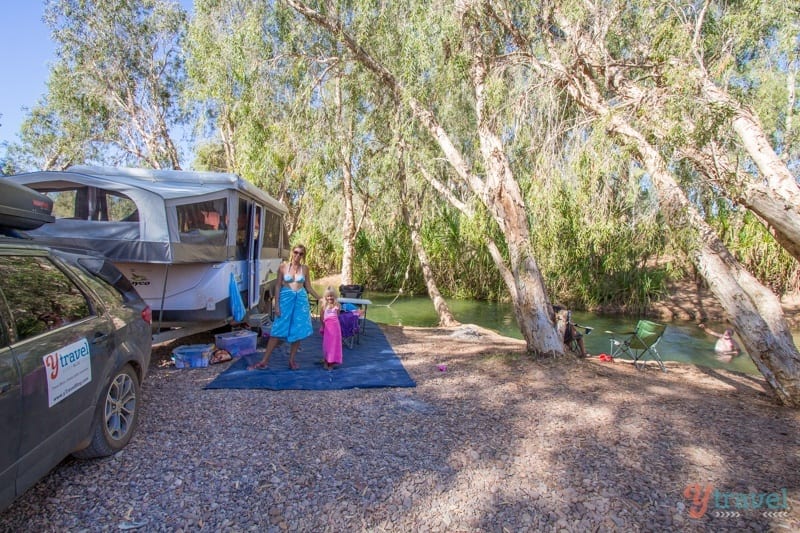
We set off on our road trip around Australia with tent camping and staying in cabins, apartments, and hostels.
One night, after sitting in our car to get a working light, while the kids slept in the tent, we looked at each other and exclaimed, “there has to be a better way.”
We decided to purchase a mobile home.
We were on the Bellarine Peninsula in Victoria getting ready to do our 2 week drive along the Great Ocean Road and after finally getting our finances approved we decided to buy a Jayco Outback Swan camper trailer.
It was within budget and we knew Jayco caravans and camper trailers held their value well for resale, important to us as we wouldn’t be keeping it forever!
We found a slightly reduced price on a brand new 2013 model at Prestige Jayco in Geelong and purchased her with bank financing.
What we loved:
- It was our first mobile home on wheels so it was exciting.
- It was light and easier to tow.
- I loved how the canvas roof and walls made it feel like we were sitting in nature and we felt more connected to the outside world
- Less space inside meant we spent more time outside.
What we disliked:
The Jayco loved rattling and shaking out the screws and things that held it together. We purchased the Jayco Outback Swan model. Of course, we were travelling around Australia, there’s a lot of Outback roads!
Guess what?
When you read the fine print, you can’t take the Outback model down the Outback roads. Yep. It’s not built for off-roads, even though it’s pitched as being that.
Nope, take it down those roads and it falls apart.
The only thing Outback about it is that it’s jacked higher up for clearance and the wheels are pretty robust.
Since our car was not 4WD, we didn’t even take the Jayco Swan down any tough driving roads, just the odd corrugated dirt tracks.
Yet, without a doubt, every time we did and opened her up to set her up for the night, cupboards needed fixing.
But, she did rattle apart a lot.
In the year that we had her, we had her fixed by a technician 5 times.
It was tough to get her fixed in Darwin as there was one registered Jayco technician and he was run off his feet! Those Jayco Caravans putter on in after a long and dusty Top End journey in need of repair.
Here’s what was wrong with ours
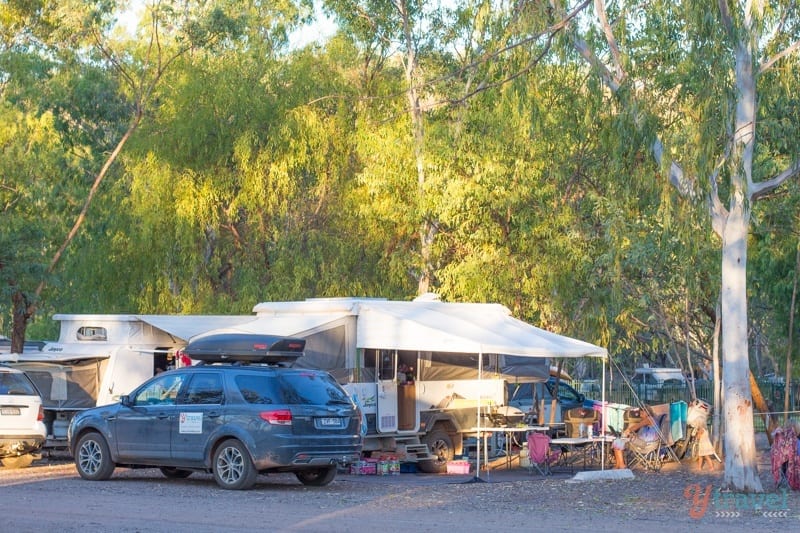
The roof cable broke
And I mean a steel cable.
The biggest issue we had was the roof. The cable that winds up the roof snapped whilst we were in the middle of the Northern Territory.
We don’t know how, we were winding her up one day and she snapped.
For three weeks, Craig had to manually lift her roof. It was only one corner, but it still meant that after we wound the roof up as much as we could, Craig had to pick up that corner of the van and hoist it up himself and quickly stick a prop under it.
It was freaking heavy and dangerous!!
Constant problems with the door
From the first day we picked it up, the door wouldn’t lock properly. We had it fixed multiple times on the trip. It’s a flimsy plastic door lock that kept popping out.
And the screws at the top of the door frame were flimsy at best, constantly creating a bigger hole than the screw making them loose.
The roof over the bed broke
We had crazy strong winds whilst staying in Denham, Western Australia.
The flimsy, plastic bit that held the bed pole up that holds the top of the bed canvas snapped and so we could not attach the bed pole to anything so we could hold the canvas roof in place.
No bed for the girls! Craig found a quick solution with duck tape, that we had to do every time we set her up for the next couple of weeks before we could get her fixed.
Don’t leave home without DUCK TAPE!!
The three-way gas system stuffed up.
We had no gas for weeks. So we couldn’t operate our fridge unless we were plugged into the mains and there was no cooking on the stove.
We certainly weren’t happy having to leave Karijini National Park early because we had no way of cooking or keep food cold and no power!
We had to run our portable fridge through the solar battery (as it was an off the grid area) That got sucked up pretty quick and all our food went off and it was 40 degrees in the shade and we were left sitting in the dark!
The bed broke
This is mostly our fault.
During pack up, don’t pull out the metal support props of the beds and then have someone jump on the bed as you’ll end up with a buckled bed frame and tracks which makes it extremely difficult to push the bed back in, lol.
I did put on weight during our road trip around Australia. Was it that much to bend a steel frame?
That came at the end of our trip in the Red Centre. What a pain to set up and pack down became as we struggled each time to push that bed track in and out.
Constant broken doors due to screws falling out and hinges breaking
She was a rattler alright! We were constantly re-screwing the doors back together.
It became common to hear those travelling around Australia affectionately calling them Jaycraps or Juncos!
Don’t miss any more of our Australia posts and travel updates. Join our FREE VIP community below.
[newsletter]
Final thoughts
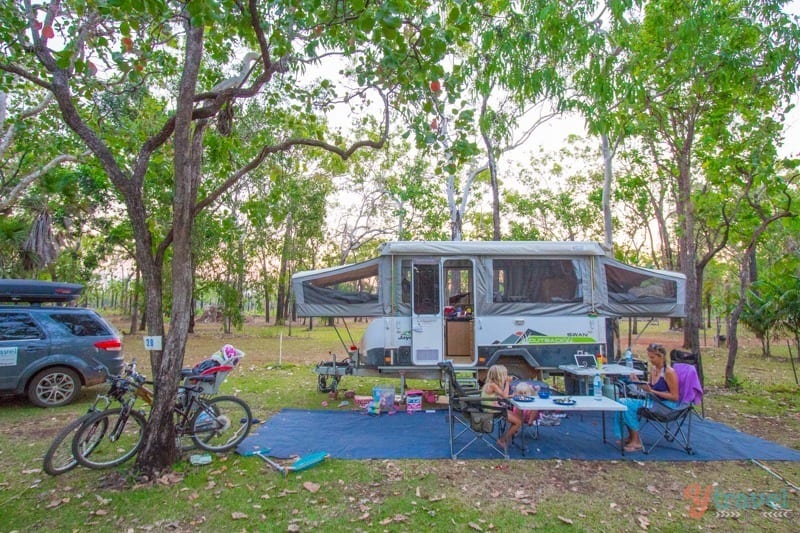
Unfortunately, it almost always comes down to budget. You can only do what you can do.
We could only get financing for a certain amount so we did the best we could at the time. It’s up to you to figure out whats’ best financially for you.
It also comes down to these other factors:
- who are you traveling with? (solo / couple / family)
- what car do you have to tow with?
- do you want to go off-road or stick to easy access places?
- how long is your trip?
- winter or summer destinations?
Jayco camper trailers are affordable and hold their value. For their price, they work okay, and gave us a home for over 12 months which we are grateful for!
I feel as if any other make in this price range may have had similar issues. But, I can’t say that for sure.
They’re perfect for short trips throughout the year and taking the family for a two-week beach holiday. You only have to set up and pack up once. You can relax for the rest of the time, and you won’t be doing any lengthy, or hard core driving so less chance of things falling apart.
They make a great home and solution under these conditions.
Someone else might have a completely different opinion, but we can only go on personal experience and circumstances.
If you don’t have the stresses of running a full-time online business and home-schooling kids and don’t have to pack up every 2-3 days and are just travelling, they might be great.
But from our experience, I do not recommend a hard-core lap around Australia in one.
The best way to travel Australia
- For a year long trip around Australia or more, we highly recommend, if your budget allows, a caravan.
- For shorter trips in Australia, a camper trailer will be sufficient as long as you are not moving frequently
Remember, these are just our opinions. Our situation, and tolerance levels, may be different to yours so always do your due diligence and choose what’s best for you!
More tips for Australia
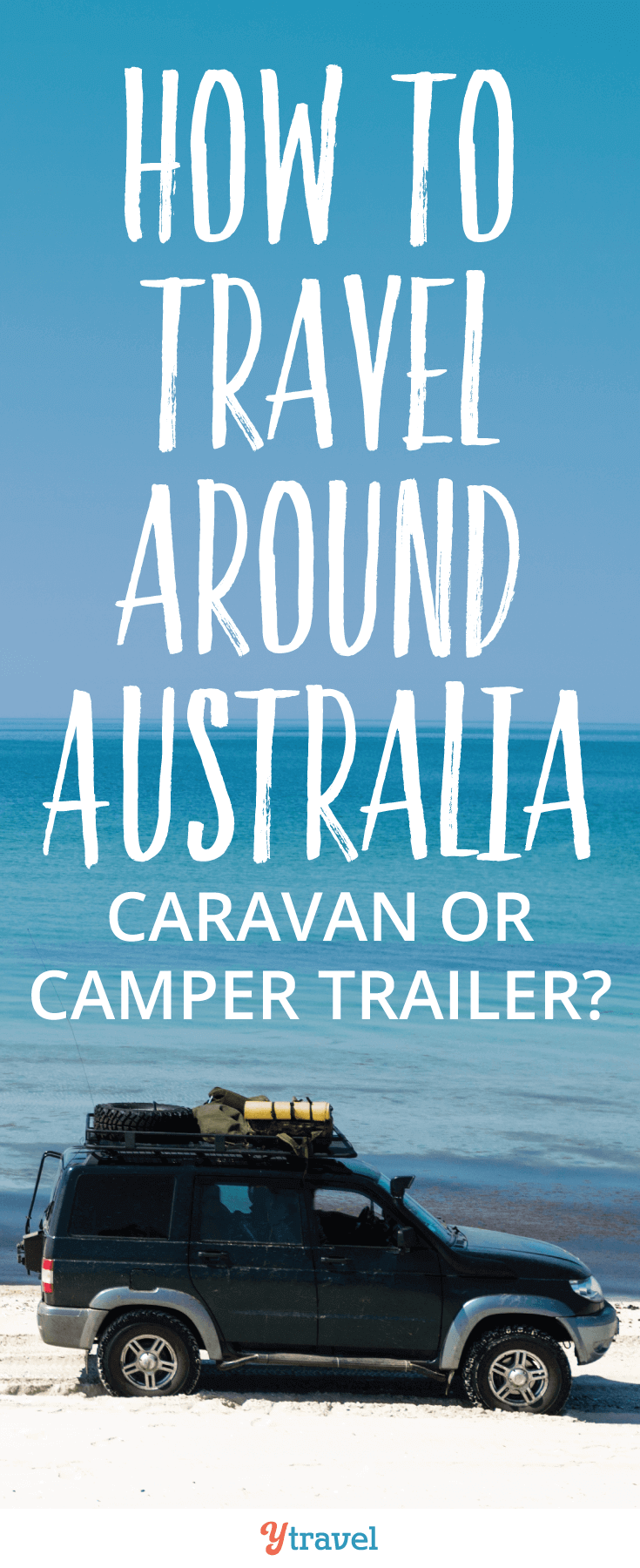
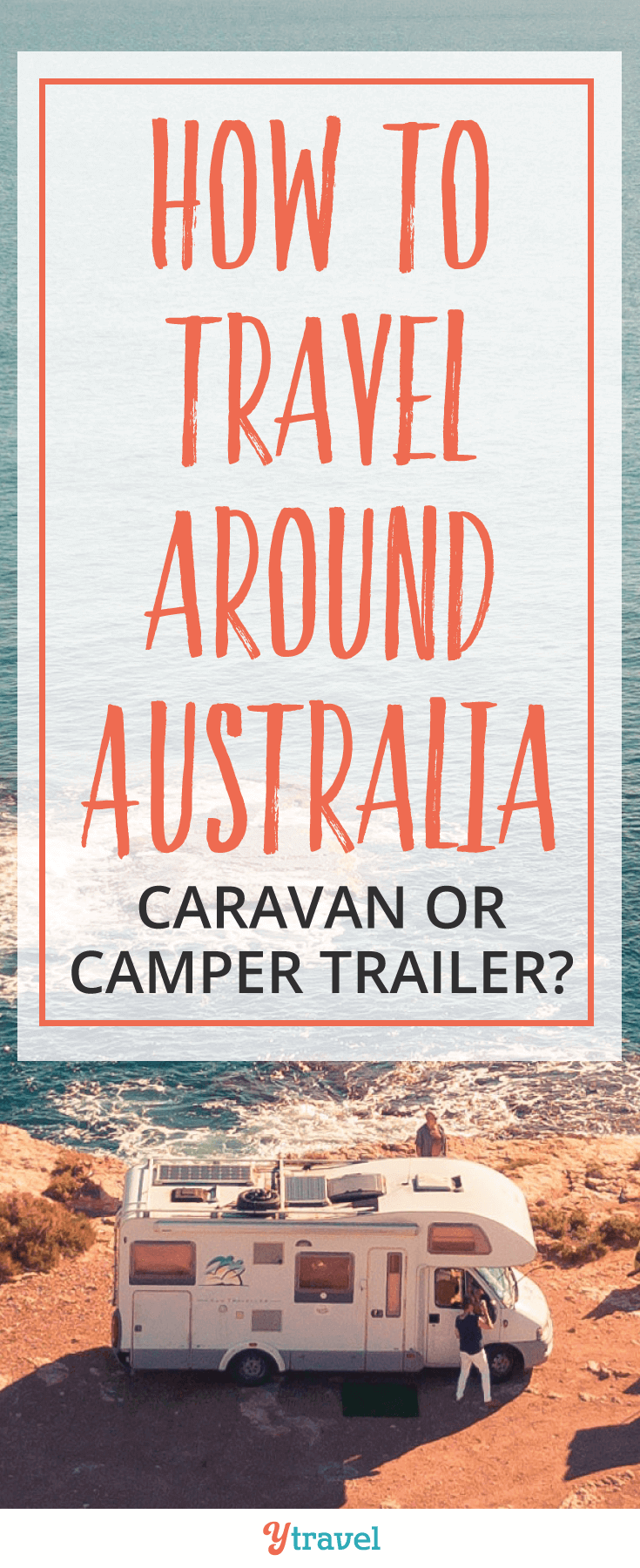
How did you travel around Australia? Please leave your tips and questions in the comments below.
Love this! We are RVers in the U.S. and just started full-timing. We love it already.
Cool. Maybe a road trip around Australia is in your future then? 🙂
Great article guys. It is a very personal choice as to how you travel; and no way you choose will be perfect for everything.
There are camper trailers that are much faster to set up though; some of the best ones can be done completely in under 10 minutes.
The best thing of all though, is technology is improving so rapidly, and camper trailers, RV’s and caravans are all becoming cheaper and better!
Aaron
Totally personal choice Aaron. And of course comes back to budget. But as long as people go travel that’s the main thing. You can only do what you can do. There’s never a perfect set up, or time to go do it 🙂
Excellent article – thanks.
We’re from the UK and a couple of years ago came over and bought a car and caravan to do a 5 month trip in Australia.
We started of on the Central Coast and within a few weeks got as far as Melbourne (missing out Sydney). We’d heard about these strange right-turns in Melbourne so for our first visit we decided to catch a bus into the city from the caravan site. We were walking to the bus stop when I just stepped off a roadside curb and heard a loud ‘pop’ – my achillies tendon had snapped. Needless to say that ended our trip.
But for the short time we were travelling the car/caravan combination gave us flexibility. Most camp/caravan sites are outside a town or city and it meant we didn’t have to pack up everything every time we wanted to visit somewhere and had the added security of being able to lock things away.
By the way, we ended up selling the car and the caravan for more than we paid for them and got to fly back to the UK in first-class thanks to good travel insurance.
Thanks again and safe travels.
Hey Keith,
We’re originally from the Central Coast, nice coincidence.
Wow, that’s too bad about your snapped achillies tendon, ouch, and it happend so simple.
Glad you were able to recoup more than your initial outlay and enjoy some luxury in biz class 🙂
Great article although a little concerning considering we are about to embark on an outback 6 week trip in a Jayco Eagle! Yes we have noticed that the workmanship is not great on ours, we haven’t had too many issues that a bit of silicone can’t fix. I wonder if anyone has had a good experience with their Jayco camper trailer whilst doing an outback trip? I’d be very interested to hear.
I think going for six weeks you’ll be fine. Everyone has a different experience with equipment, just writing from our personal lessons. And our frustrations were compounded by having to run a full-time online business with crappy internet and home-school our kids. Our choice of course but all that brings unique challenges 🙂
Hi Michelle
No matter what you take or do prep and a little know how gets you a long way.
Being going through the outback for a while now and yep always something will break. The things that helped us were tools and adaptation small welder bits of right angle thick Steel some a power tool set like makita kit small amount of welding knowledge is invaluable. Broke down in communities a few times and talking the locals able to barter spare parts of there car piles.
Good article but I think the issue is not just about caravans vs campers but the intent of the use for outback travels. An unsuitable caravan will also rattle itself to destruction on outback roads. So regardless of caravan or trailer, if you want to be able to travel off bitumen it needs to be a true full off road model. Many of those sold as off road are not suitable for off road use (as you discovered). In order to travel on outback roads I think as a minimum it needs for both a caravan and trailer. 1) Independent Off Road Suspension including high quality shock absorbers (carry spares) 2) A heavy duty full chassis. 3) High clearance and off road hitch. 4) Quality build, this is sometimes harder to determine but pop-rivets, plastic fittings, screws in chipboard are almost certainly going to fail on a long outback trip. There are many vans and trailers advertised as heavy duty off road that lack many of these basics or the build quality is suspect. I travel alone and like to access more remote area’s and so many trailers seem to be designed for large families setting up camp for long periods of time and the set up times you mention associated with these for just one night stops. A good economic alternative for singles or couples are forward fold campers where the set up time in minimal. These can sleep more people with extra set up time. An option not mentioned is the Hybrid, a cross between a van and trailer. These have most of the benefits of a van but can have true full off road capability without the weight and size limitations of a van. Of course it all comes back to budget but for a long outback trip where a lot of dirt roads and remote locations are involved I think you need to purchase the most capable full off road accommodation your budget can stand. i.e. The luxuries of a less capable caravan will soon be forgotten if it slowly self destructs during your trip. There are vast price differences and quality between vans and trailers being sold as full off road capable. Not a lot can be reliably gained by reviews and blogs on the web. Suggest you talk to people who have done similar trips to what you have planned (driving to Longreach on the highway is not the same outback trip as along the Gibb River Road) and seek their opinions on how well their gear stood up.
Appreciate your insights John. Yeah, there’s definitely a lot to consider. Essentially it comes down to where exactly you want to explore, how much “off-road” driving and camping you want to do, your budget, and size of family?
There is no one perfect caravan or camper for everyone but like you said it’s best to talk with those who have gone down the path you wish to tread!
I am planning my post retirement trip to Australia. Started as two weeks, then four, now even longer. I want to travel on my own, not a formal tour group. I hate someone telling me I have to leave when I’m not ready or stay when I’m not interested. I’ll do some hop-on-hop-off local tours.
I was on a cruise in the Caribbean this winter and asked one of the staff from Australia what were the top five or ten places not to miss for someone visiting her homeland. She couldn’t come up with any!
So what would you put on the list?
These are our favourite Vanessa https://www.ytravelblog.com/best-towns-in-australia-b/ We’ve a ton of content on our site on Australia to help you with your planning
You have covered things really well in your article. We also travel Australia full time, and we fall under the category of motorhome even though we travel in a gorgeous 50-year-old vintage bus.
It is all about personal choice. We purchase our bus after starting out in a camper trailer and roof top tent, That set up became limiting and tiring as we were sick of certain aspects as you mentioned.
We stopped and worked for 12 months in Brisbane (while also travelling abroad to Asia and Fiji) and renovated the old girl to be exactly what we wanted. It was certainly worth it for us.
We tow our small 2 door car behind the bus so we can stop and camp for several days to weeks in one spot and have our zip about to get us from A to B. We also have an offroad set up with our 4×4 and 18-foot boat that one of us drive. Our camping and 4 x 4 set up gives us the freedom to explore areas our bus cannot go. Our bus has a normal house kitchen built in, plus we have a Ikea Lounge, bedroom areas, shower and toilet, air con and even a laundry. We are fully off the grid with solar and we even have a large 210-litre fridge and freezer. We have the bus for luxury giving us the pleasure of having a full home on wheels not making us feel like we are suffering or want to rush the trip.
We are now hitting our 3rd year on the road and our set up works well. Yes we look like a travelling circus but as we work and travel as we go, we are happy to pay the extras for our vehicles so no matter what situation we find ourselves in, we have it sorted. Love this life we have created. We are hoping to live like this for the next 10 years.
Hi Blended
Have you guys got a travel blog site.
Can you explain a little clearer please. So you have the bus and tow a little car, then you have the 4wd with the boat? So where does the 4wd live while you are travelling in the bus?
Great advice as usual, I agree with the camper trailer wisdom. On our big lap we didn’t plan to stay anywhere less than 4 days or the thought of packing down the CT was too much to bear. My hubby and I got quite quick at setting up our CT, from an hour down to 20 mins and pack up went from two hours down to 30 mins. Sometimes in the free camps or along the Nullabor we could do set up in 10 mins if we ditched the awning and concentrated on just the basics so we could literally just sleep and go again in the morning. Aahhh, makes me want to do it all again just talking about it. Tanya 🙂
Thank you for your blog…. very informative…. I must admit I chuckled a little reading about the Jayco experience….. at the moment I am trying to decide on buying a Jayco penguin outback for my first big trip…. I now have second thoughts!! Thanks again.
Hi Caz,
I’m interested to know how you overcame your storage problems. Me, my husband and my 2 sons are also going to go around Australia beginning of next year for a year. We’ve kind of decided to go with a camper trailer as well (due to budget mainly) but I’m a bit worried about the lack of space. I’ve told my husband that we’d need a bigger car, but he’s hesitant to get too big a car because of the price.
How did you overcome this? Do you have an article talking about what stuff you took or what you needed and if you could fit it all, etc. Any tips on this?
Thanks in advance,
Kathy.
We had a Goldstream camper – relatively minor problems ( water pump and minor wear and tear) over five years. Would recommend over Jayco equivalents.
We’ve been contemplating a caravan or camper trailer or to stick with our usual road trip cabins. This was a great article and very helpful! Thank you – if only we could win a caravan!
Hi guys, my wife 3 kids and i have had camper trailers for the last 10 or so years,the places and memories
we have are the fondest and most cherished.you dont have to spend a gazillion dollars on travel
when in your own backyard you have what we have.
my wife and i now have started our own camper trailer business, so please drop us a line if your in Perth.
for any info on places to visit.
safe travels peter
Great article guys. It is a very personal choice as to how you travel; and no way you choose will be perfect for everything.